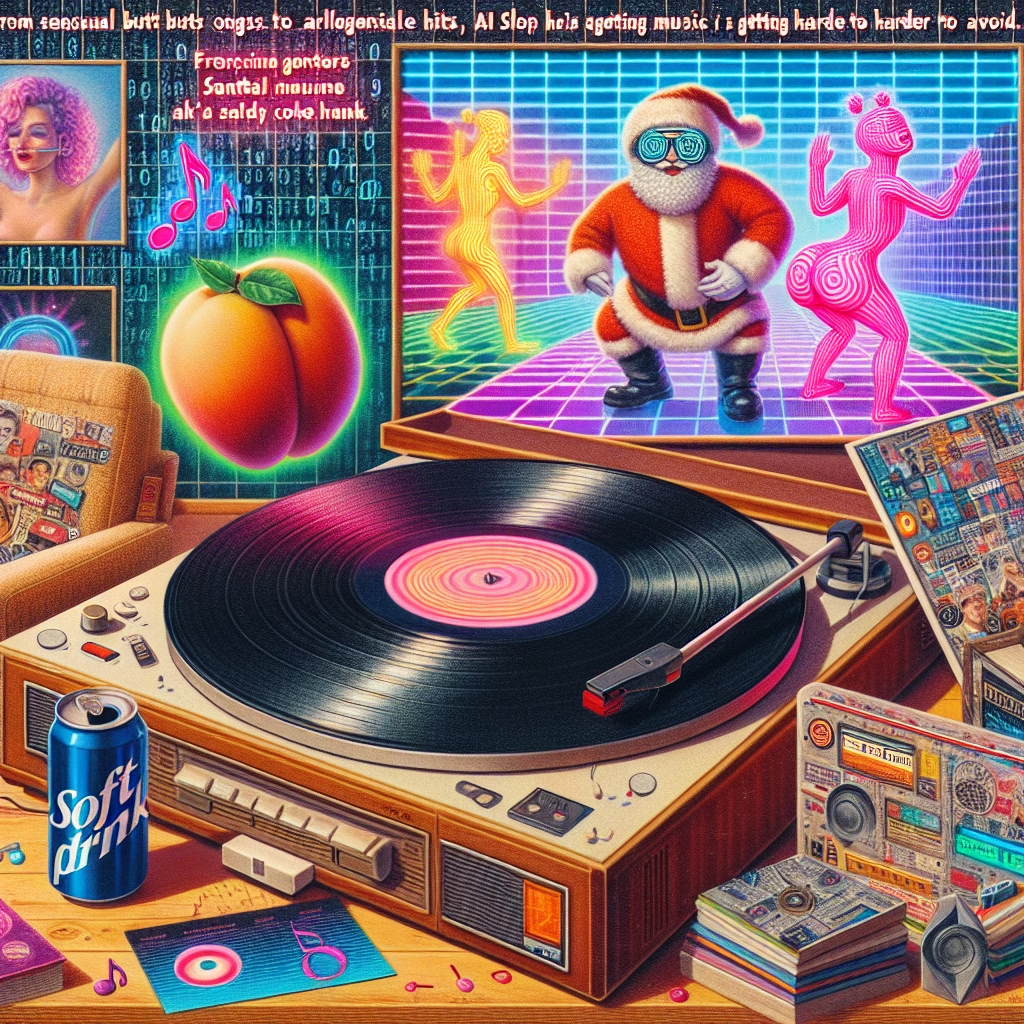From Sensual Butt Songs to Santa’s Alleged Coke Habit: AI Slop Music Is Getting Harder to Avoid
The Rise of AI-Generated “Slop” Music
In the ever-evolving landscape of digital creativity, artificial intelligence has emerged as both a powerful ally and an unsettling disruptor. Among its many artistic applications, music generation has taken a startling turn—from helpful collaboration tool to an automatic content factory. The result? A tidal wave of AI-generated songs so offbeat and bizarre that they’ve earned the tongue-in-cheek nickname: “AI slop music.”
Whether it’s synthetic odes to curvaceous anatomy or unhinged tracks about Santa Claus’ alleged drug habits, this strange subgenre is gaining traction across streaming platforms and social media feeds alike.
What Exactly Is “AI Slop Music”?
“AI slop” refers to content—especially music—that is rapidly and cheaply produced by artificial intelligence models with minimal curation, creativity, or quality control. This type of music often features surreal lyrics, unnatural vocals, and repetitive structure. It may be humorous, eerily unsettling, or simply baffling. But above all, it’s becoming more visible than ever, thanks to the sheer ease of AI content creation.
- Generated En Masse: AI tools like Suno, Udio, and others allow users to input just a prompt and receive a full song within minutes.
- Bizarre Subject Matter: Topics range from romantic body parts to parody tracks about pop culture icons.
- Minimal Human Input: Often, these tracks are created and published with little to no human editing or oversight.
Why AI Music Is Flooding the Internet
AI music generation has reached a point of accessibility that mirrors early social media meme culture. Anyone can create content quickly, and distribution channels like TikTok, YouTube, and Spotify amplify it. Some creators are doing it for laughs, some for monetization, and others just to experiment.
Micro-virality and Algorithm Hackery
On platforms where clicks and emotions drive discovery, AI-generated slop is tailor-made for virality. A song about Santa snorting coke may be offensive to some and hilarious to others—but either way, it grabs attention. The algorithm doesn’t care about ethical nuance; it cares about engagement.
- Shock value gets views – Outlandish prompts equal outrageous output
- Quick production cycle – It takes minutes to create and upload
- Low cost, high reach – Cheap to make, potentially profitable through views or ads
Popular AI Music Platforms Fueling the Craze
There are several AI music generators at the center of this trend. These tools offer varying levels of customization, inspiration, and randomness. Some platforms even simulate human voices with uncanny precision.
The Big Players:
- Suno: Known for its ease of use and ‘instant-hit’ generation capabilities.
- Udio: Prioritizes audio clarity and stylistic finesse, though it too can produce strange outputs.
- Boomy and Soundraw: Allow users to generate and publish full-length songs almost immediately.
These platforms essentially allow users to act as record label and artist in one, mixing genres, themes, and moods at lightning speed. Unfortunately, the ease of use also leads to careless, uninspired, or even intentionally offensive outputs.
A Cultural Mirror—or a Dumpster Fire?
Some argue that AI slop music is a form of digital folk art, reflecting the absurdity of online culture in real time. Others see it as a warning sign of quality degradation in music and misinformation in media. Regardless of opinion, it’s clear that AI-generated slop is not going away any time soon.
Ethical and Artistic Concerns
- Originality is at risk – Many AI tracks are recycled patterns or mimic known artists’ style.
- Moderation issues – Songs with harmful or inappropriate themes can slip through the cracks.
- Loss of Humanity – When machines create music without human emotion, is it still art?
There’s also a growing concern about using deceased or living artists’ voices without permission, creating posthumous AI duets or parody songs that blur the line between satire and exploitation.
How AI Slop Is Impacting the Music Industry
While meme-worthy tracks may feel harmless, the ripple effects for the traditional music industry are undeniable. Labels and streaming platforms are struggling to detect and moderate AI-generated songs, especially as quality improves and volume explodes.
Challenges for Human Artists
- SEO clutter – Search systems are overwhelmed with low-effort AI songs, burying real creators.
- Royalty confusion – AI music often samples or resembles licensed material, creating legal gray areas.
- Audience fatigue – Too much meaningless content can alienate listeners seeking authenticity.
To stay competitive, many artists are collaborating with AI—using it as a tool for inspiration rather than full automation. But there’s a lingering fear: will listeners start to prefer surreal slop over true storytelling, simply because it’s weirder or more clickable?
What Can Be Done?
As with any new technology, regulation and education are key. Listeners need to become more aware of what they’re hearing, and platforms must build better content filters to distinguish between art and algorithmic slop.
Potential Solutions:
- Labeling standards – Require AI-generated music to be clearly identified as such.
- Ethical prompts – AI platforms should limit prompts for offensive or misleading topics.
- Support real artists – Audiences can make conscious choices to stream human-made music.
Ultimately, the value of music lies in its ability to resonate emotionally and culturally. AI may be clever, but human intention and connection are still irreplaceable.
Final Thoughts: Get Used to the Noise
Whether you love it, hate it, or can’t stop laughing at it, AI slop music is becoming a key element of today’s digital soundscape. As with junk food or clickbait articles, there’s a temptation to consume it—even when we know it’s low quality.
But buried beneath the nonsensical lyrics and synthetic beats may lie an important cultural truth: we are overwhelmed by content, and we’re using humor and absurdity as coping mechanisms in a world ruled by algorithms. In the meantime, that “Santa snorted coke” ballad will keep playing in someone’s For You feed.
So buckle up. Musical robots are here, and they’re weird.
< lang="en">







Leave a Reply